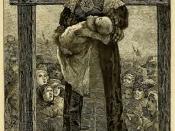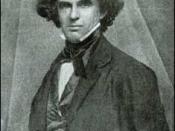The characters in "The Scarlet Letter" deceive themselves by hiding their identities behind false truths, which hinders their knowledge and understanding. Nathaniel Hawthorne summarizes the necessity of honesty when Hester states, "In all things else, I have striven to be true! Truth was the one virtue which I might have held fast, and did hold fast through all extremity . . . a lie is never good, even though death threaten on the other side!" (191). Honesty is crucial to life because lies limit self-growth.
Roger Chillingworth's change from a scholar to someone obsessed with having revenge against the one who stole the love of his wife demonstrates how just limited a person can become. When he visits Hester Prynne in the prison, he is introduced as a wise, intelligent man. However, hints of the person he will become are already being given. Suspicious of his motives for keeping his identity a secret, Hester asks her husband if he is the ".
. . Black Man that haunts the forest round about us? Hast thou enticed me into a bond that will prove the ruin of my soul?" Chillingworth tells her, "Not thy soul . . . No, not thine!" (71). When they speak to each other again seven years later, Hester sees that the ruined soul is indeed not Hester's, nor is it Dimmesdale's; it is Chillingworth's soul that has decayed. For so long, his sole purpose has been to torture Dimmesdale, and now Roger even looks like the devil he has become. After Dimmesdale's death, "All his strength and energy-all his vital and intellectual force-seemed at once to desert him; insomuch that he positively withered up, shriveled away, and almost vanished from mortal sight, like an uprooted weed that lies wilting in the sun" (164, 257). Chillingworth...


